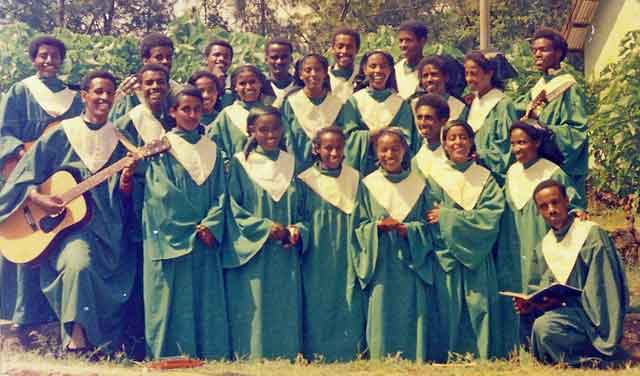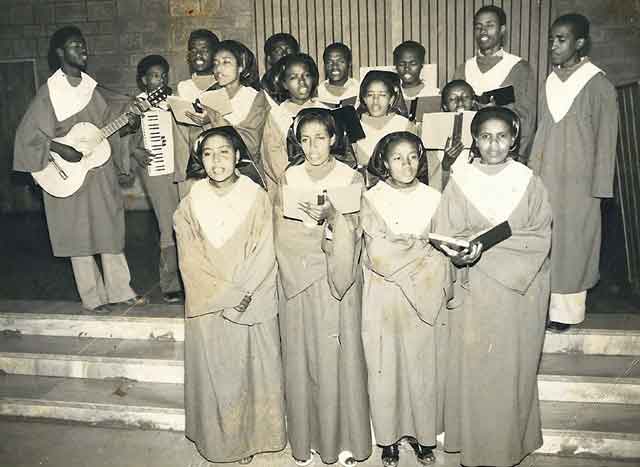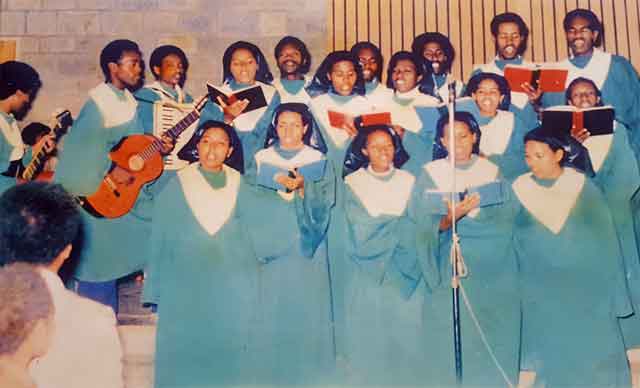The Ethiopian Evangelical Church Mekane Yesus congregation in Debre Zeit—a major city now renamed Bishoftu—was established in 1969. It was the first Evangelical church in the town and founded on the roots of the Debre Zeit Evangelical College, a missionary institution started a dozen years before. In 1973, the congregation recruited its first full-time pastor, Rev. Regassa Bedada. The military junta that toppled Emperor Haile Selassie’s regime in 1974, soon closed the vast majority of churches in Debre Zeit. Since the Mekane Yesus congregation faced a similar fate only in 1982, it served the whole Evangelical community in the town for almost eight years.
Those were the glorious days of the congregation. Sunday services were fully packed both in the morning and afternoon sessions. Hundreds of people attended the Bible studies on Tuesday and the prayer and healing sessions on Friday evenings. Numerous persons converted to the Lord.
The Mekane Yesus choir was established in 1976. The choir members were composed of people from different evangelical denominations such as Mekane Yesus (Lutheran), Kale Heywot (Baptist), Meserete Kristos (Mennonite) and Mulu Wongel (Pentecostal). The Marxist government’s massive crackdown against these communities has brought them together in a truly authentic Christian unity. That paved the way for the spiritual awakening and revival that the church experienced in those days.
The choir’s role in this revival was crucial. The songs written and sung by the choir were sources of strength and faith. They also served to comfort and soothe the spirits. They were like the breath through which the singers expressed themselves—worries and fears, joy and praise, faith and commitment.
The choir published its only album in 1980. The cassette has the title of the choir’s best-known track, the Easter song Meqabirun feneqaqelew (‘He turned the grave upside down’). The publication of the album was a miracle in itself since it had to get a pass from the censure office that supervised every work of art for anti-Marxist contents. Some songs included in the album openly defied the government of those days and its slogan, ‘The Revolution is above everything’. To give but one example, the lyrics of the song Yebelayoch belay new profess, ‘Our God is the Creator, Commander, the holder of the universe […]. He is above all on high, and above Him, there is no high-ranking one.’
There are more than 250 Amharic songs that originated from the choir. Of all its members, Habte Gebrehawariat might be the person who contributed most songs, including Yebelayoch belay new. Wondiye Ali also submitted a significant number of pieces. (Later on, Wondiye’s passion for literature led him to publish two books of poetry, three volumes of church history and more than 20 biographies of prominent Ethiopians.) The musicians were Hailegiorgis Habte (lead guitar), Habte Gebrehawariat (base guitar) and the late Yirga Alemu (accordion). Dembele Simesso was one of the leaders of the choir.
In December 1982, the Ethiopian Air Force confiscated the Mekane Yesus church building. For the next two years the congregation was allowed to celebrate its services in a tent. After that, the church had to retreat to home services. Several believers, including choir members, were imprisoned. Some church members were tortured to turn against the Gospel; others fled the town in search of a better life.
The last public ministry of the original choir took place in Wonji (about 50-60 km south of Debre Zeit) in 1982. Most members of the choir still remember that day since dozens of people came to know the Lord. The presence of the Holy Spirit was so heavy that the lead guitarist couldn’t even play.
After the confiscation of the church, numerous choir members went to Addis Ababa or joined other denominations such as Kale Heywet Church. As the members were no longer together in the same congregation, the choir service after 1982 was on an ad hoc basis and when invited. Nowadays, the choir meets several times a year like a family to share memories, to pray for one another, to give a supporting hand and to have fellowship. Most members of the group try to pass the mantle of gospel singing to the next generation.
Album
(1) _ _ _ [መቃብሩን ተገልብጧል ?? (Backtransl. accor to Google), He turned the grave upside down’). Cassette with Amharic songs, released by …[YDCS ??], Addis Ababa (?), 1980.
Songs in hymn books
Səbhat läʼamlak
[Any song included?]
Mərt mäzmurat (1975-1980)
Vol. 4:7
Unpublished songs
The choir had a mimeographed songbook with about 220 songs.
» Read manuscript
Connect
» Visit the Debre Zeit MY Congregation’s YouTube channel
Audio
Album
[published in 2022; no longer available]
Songs with lyrics
ያሻገረኝ በድል ያወጣኝ (clip publ. in 2023)
Video
Debre Zeit Evangelical Choir in 2020:
The congregation’s anniversary in 2019:
Pictures



Further reading
Magazine issued for the congregation’s 50th anniversary.